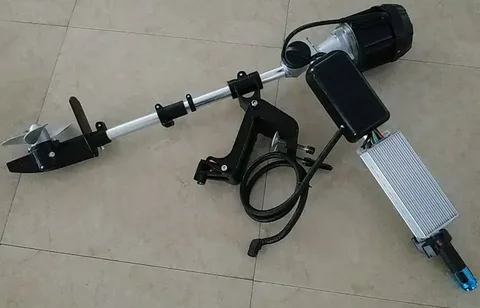Electric Boat Motors | Are They Any Good? Strength, Size, and Speed Explained
Unlike gas-powered motors, electric motors are considered a clean, silent, and efficient alternative. This leads to the following question: Are electric boat motors good? What is the best power electric motor for various boats? What size of an electric motor do you require for the boat in order to achieve certain speeds? In this blog, we’re going to focus on answering these questions while analyzing the advantages and disadvantages of electric boat motors.
Are Electric Boat Motors Any Good?
The rapid advancement in battery technology and motor efficiency has resulted in improved electric motors for boats. There have been certain factors identified where they stand out for boaters:
Eco-Friendly: Electric boat motors produce zero emissions, making them environmentally friendly.
Enhanced Experience: Without gas engines, electric motors function without sound. This makes for an enjoyable boating experience.
Maintenance: As a result of a lack of moving parts, the electric motor requires less maintenance.
Fuel: The primary cost associated with electric motors is high initially, however, the savings on fuel and maintenance expenses is worth it.
Ease of Use: similar to that of a gas motor, electric motors have a simple interface, with no mixing of fuel required and it operates with a single button.
Even though electric boat motors have advantages, they also have disadvantages. Because of restricted battery life, they’re typically better fit for smaller boats, calm waters, and shorter trips.
Which Electric Boat Motor Has the Most Power?
The strength of an electric boat motor features thrust (in pounds) or unit of power called horsepower (HP). The most powerful electric boat motors have up to 180 pounds of thrust which is equivalent to approximately 5-10 HP. The best electric boat motors include:
Torqeedo Deep Blue Series: It is the best for high performance since the Deep Blue series provides up to 100 HP for larger boats.
Minn Kota Terrova: Best favored by fishing enthusiasts, this motor boats up to 112 pounds of thrust along with precision and force.
Newport Vessels NV-Series: Best suited for small to medium boats, these motors provide a maximum of 86 pounds of thrust.
Make sure that the size and weight of the boat as well as the intended purpose come to mind when looking for the best motor силу щ ёoine.
How Big of an Electric Motor Do I Need for My Boat?
The size of an electric motor suitable for your boat is determined by its weight, type, size, and how you plan to use it, among other factors. Below are some pointers that can guide you in making a decision:
Boat Size And Weight:
– Small boats (under 16 feet): 30-55 pounds of thrust
– Medium boats (16-20 feet): 55-80 pounds of thrust
– Large boats (over 20 feet): 80+ pounds of thrust
Type Of Water:
– Calm lakes and rivers: Lower thrust motors are sufficient
– Coastal or rough waters: Higher thrust motors are recommended
Boat Usage:
– Fishing or trolling: Opt for motors with variable speed control
– Cruising or water sports: Choose higher thrust motors for better performance
Check your manual to your boat’s make and model. Most manufacturers provide recommendations regarding thrust and motor size.
How Fast Does An Electric Boat Motor Go?
There isn’t a definitive answer to this question as every boat operates differently. Factors such as the motor’s power, size of the boat, and its battery all play a crucial role. While most electric motors clock in at speeds between 5-10 mph (8-16 km/h), other high performance motors such as the Torqeedo Deep Blue shred the waters at 20 mph (32 km/h) and sometimes even higher.
For example:
A 30-pound thrust motor can push a small boat at about 5 mph.
A medium-sized boat can reach speeds between 10-12 mph with a 100-pound thrust motor.
Although electric boat motors do not reach the same speeds as gasoline engines, they are silent and environmentally friendly, perfect for leisurely cruising.
Advantages of Electric Boat Motors
Electric boat motors provide many benefits when compared to traditional motors that run on gasoline:
Eco-Friendly: Electric motors have no emissions, making them a better choice for the environment.
Quiet Operation: Better the boating experience by not being disturbed by the noise of a gas engine.
Low Maintenance: With fewer moving parts comes less wear and tear.
Cost Savings: Spending less on fuel and maintenance adds up over long periods of time.
User Friendly: Electric motors with simple controls are easy to use.
Disadvantages of Electric Boat Motors
Electric boat motors do come with their fair share of drawbacks.
Driving Range: Distance you can travel on a single charge is limited with the battery.
Speed: Electric motors aren’t as fast as gas engines.
Amount of Money: Motors and batteries can be expensive upfront.
Recharging can take several hours.
Uses of Electric Boat Motors
Electric motors are common in:
Fishing: The low noise of electric motors makes them particularly useful for fishing.
Recreational Boating: Great for enjoying a pleasant cruise on calm water.
Eco-Tourism: Many eco-tourism operators use electric motors to reduce environmental impact.
Small Watercraft: Electric motors are standard in kayaks, canoes, dinghies, and other smaller watercraft.
What Electric Boat Motors Still Need To Work On
Electric motors are likely to be more advanced in efficiency, performance, and power optimization in the coming years. Some trends shaping the future of electric boat motors include:
Battery Technology Advancements: More enduring batteries will increase the range in which electric motors can be utilized.
Solar Charging: Mounting solar panels help replenish batteries and fewer external sources will be needed for charging.
Hybrid Systems: The best of both gas and electric engines,
Finals Thoughts
Electric boat motors provide a fantastic quieter long-range option for low-maintenance, eco-friendly motors for boats. They might not serve all purposes in recreational boating, fishing, and eco-tourism, though their drawbacks are minimal.
Remember to think about the size of your boat, it’s weight, and use when picking an electric motor so that you get one that matches your needs best. Boat motors have come a long way, and with new technologies emerging, electric motors are expected to be more powerful and efficient, which sounds great for the future of boating.
Knowing the pros, cons, and uses of electric motors will allow you to make better decisions while enjoying a quieter and more sustainable alternative to traditional boating.




Post Comment